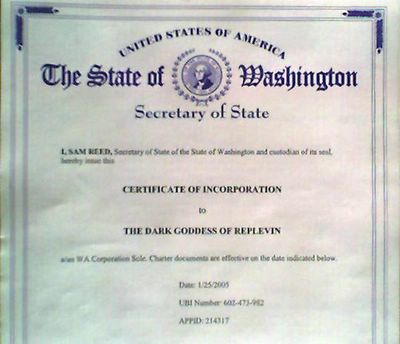Here's the deal.
- Washington state doesn't have "divisible divorce:" that is, you have to deal with everything all at once, property, kids, child support, debt, the whole meal deal. There are limited exceptions but you have to follow procedures that PBS's lawyer didn't.
- Washington state has a presumption that a child born within a couple of hundred days after the conclusion of the marriage is a child born OF THAT MARRIAGE. Proving otherwise takes more than commonsense assumptions.
- Judge Bastine's actual oral decision, the transcript of which I'm still trying to snag, indicates that he addressed the following issues:
- when you obtain a default decree or judgment you cannot be granted relief different than that sought in the petition. Civil Rule 54(c). The petition recited that PBS was not pregnant. In order to finalize a decree that dealt with the new baby, she'd have to reserve the husband with a new petition alleging the pregnancy. He needs to be put on notice that there may be a child that, his or not, is still presumptively his. No indication that this PBS's attorney did this, though she's had plenty of time since the pregnancy became known. This is important because, absent taking some court action with respect to this dissolution, the husband could find himself down the road paying child support for a child that is not his and as to which he received no notice when he got the divorce petition in the first place. This is not a Good Thing.
- Washington's statute on disestablishing paternity of a child (remember the presumption I cited a moment ago?), RCW 26.26.550, allows the action to be commenced before birth, but specifically states that the action cannot be completed until after the birth of the child.
- Therefore, in this case PBS was unknowingly trying to disestablish paternity in direct contravention to the statute.
Now, the Stranger article, waxing somewhat hysterical, says that "the Dissolution Act doesn't say anything about pregnancy." Um, no, but every first-year law student learns about a doctrine of statutory interpretation called in pari materia, which just means that different statutes on the same subject have to be considered together, even if they're enacted at different times. The Stranger is a great publication but they don't know dick about family law.
Oh, and what makes me think I do? Well, I'm a Washington attorney who has practiced family law for a number of years. And it's not just me who thinks this.
Let the flames begin.

1 comment:
Oh, of course, the Judge was correct...talk about poor planning, this woman is the poster child for it...
She already has two chilren and is on welfare...gets pregnant a few months before her husband's release date by another man (who is also in prison) and is MAD that they wouldn't let her divorce before she delivered...
Please...
What if this other guy isn't even the father? Not to mention setting a precedent that could negatively impact every other married pregnant woman in Washington State...
I agree with this Judge 1000%...
We shouldn't be letting these women set precedence for all the rest of us anyway...
Post a Comment